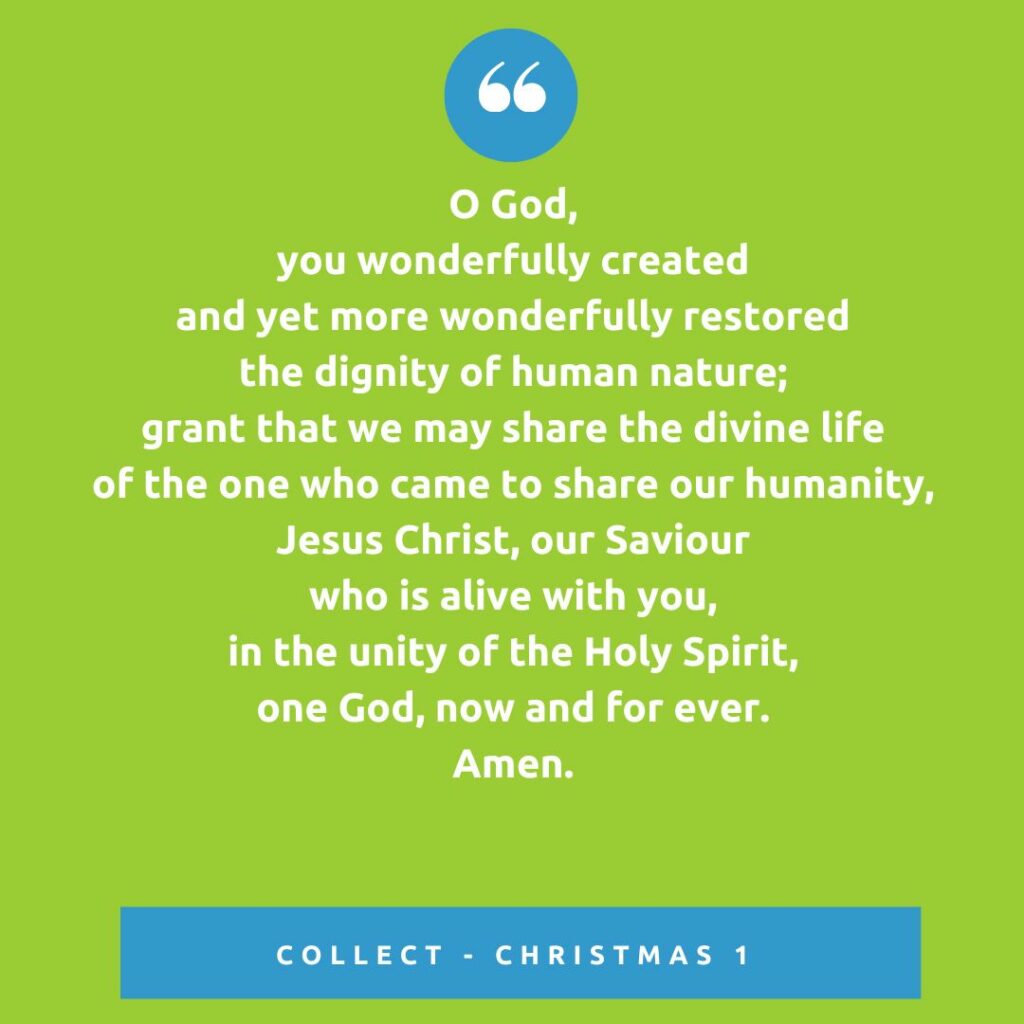
Let us pray (in silence) [that we may grow into the life promised at Christmas]
Pause
God, [or God of incarnation]
you wonderfully created
and yet more wonderfully restored
the dignity of human nature;
grant that we may share the divine life
of the one who came to share our humanity,
Jesus Christ, our Saviour
who is alive with you,
in the unity of the Holy Spirit,
one God, now and for ever.
Amen.
This prayer was in the Veronese and Gelasian sacramentaries, and continues into Roman and Anglican rites.
Deus qui humanae substantiae dignitatem et mirabiliter condidisti et mirabilius reformasti, da quaesumus ut eius efficiamur in diuina consortes, qui nostrae humanitatis fieri dignatus est particeps
Consortes refers to people sharing in a community of goods, sharing something in common. There are allusions to 2 Peter 1:4, “that …you … may become participants in the divine nature.” And John 1:12, “to all who received him, who believed in his name, he gave power to become children of God.”
God’s self-emptying love (See Philippians 2:5-7) is not one step, followed by our sharing in divinity – Christ’s humanity shares in God’s act of self-emptying love.
From Leo the Great’s Christmas sermon (440AD):
For the Son of God in the fullness of time which the inscrutable depth of the Divine counsel has determined, has taken on him the nature of humanity, thereby to reconcile it to its Author: in order that the inventor of death, the devil, might be conquered through that (nature) which he had conquered…Christian, acknowledge your dignity [dignitatem], and becoming a sharer [consors] in the Divine nature, refuse to return to the old baseness by degenerate conduct. Remember the Head and the Body of which you are a member. Recollect that you were rescued from the power of darkness and brought out into God’s light and kingdom. By the sacrament of Baptism you were made the temple of the Holy Spirit.
reformo – to shape again, remould, transform, metamorphose, change.
substantia – nature
consors – sharing property with one (as brother, sister, relative), living in community of goods, partaking of in common, a sharer, partner. Formed from cvm and sors (“fate”) – having a common fate or destiny.
dignitas – dignity
This collect was adapted for the preparation of the chalice in the Roman rite.
Thomas Merton (Fr. Louis) was speaking to a group of his novices:
“There is only one thing for anybody to become in life.
There’s no point in becoming spiritual – the whole thing is a waste of time.
What you came here for is to become yourself, to discover your complete identity to be you.
But the catch is that of course our full identity as monks and Christians is Christ.
It is Christ in each of us…
I’ve got to become me in such a way that I am the Christ that can only be the Christ in me.
There is a Louis Christ that must be brought into existence and hasn’t matured yet. It has a long way to go.”*
There is a Louis Christ (a Thomas Merton Christ), a you Christ, a me Christ – each one of us is called and graced to be our true self – the self that God has made us to be.
God has become what we are, what I am, so that I/we might become what God is (Irenaeus).
The collect is slightly stronger in the American BCP adding “grant that we may share the divine life of him who humbled himself to share our humanity, your Son Jesus Christ”.
The collect comes from the Leonine sacramentary where it is the collect of the first Christmas Mass (1239). The Gelasian sacramentary moves it to be one of the Christmas prayers for Lauds or Vespers (27), and the Gregorian sacramentary has it as one of the “other prayers for the birthday of the Lord” (59).
In Celebrating Eucharist I have also placed it, as the American BCP has, as the collect concluding the first reading at the Easter Vigil. There I have restated it as:
Bounteous God,
you wonderfully created
and yet more wonderfully restored
the dignity of human nature;
grant that we may share the divine life
of the one who came to share our humanity,
Jesus Christ, our Saviour. Amen.
*The quote is from The Lure of Saints A Protestant Experience of Catholic Tradition by Jon M. Sweeney. Merton was talking to the novices in relation to William Faulkner’s (~1942) short story “the bear” – The story of a young man’s development against a background of vanishing wilderness.
O God,
you wonderfully created
and yet more wonderfully restored
the dignity of human nature;
grant that we may share the divine life
of your Son Jesus Christ,
who lives and reigns with you
in the unity of the Holy Spirit,
one God now and for ever.
Amen.
NZPB p. 557
